Once upon a time, long ago, there lived a poor farmer. He had a small piece of land which he plowed and sowed before nightfall, and then went to the forest to graze his two oxen.
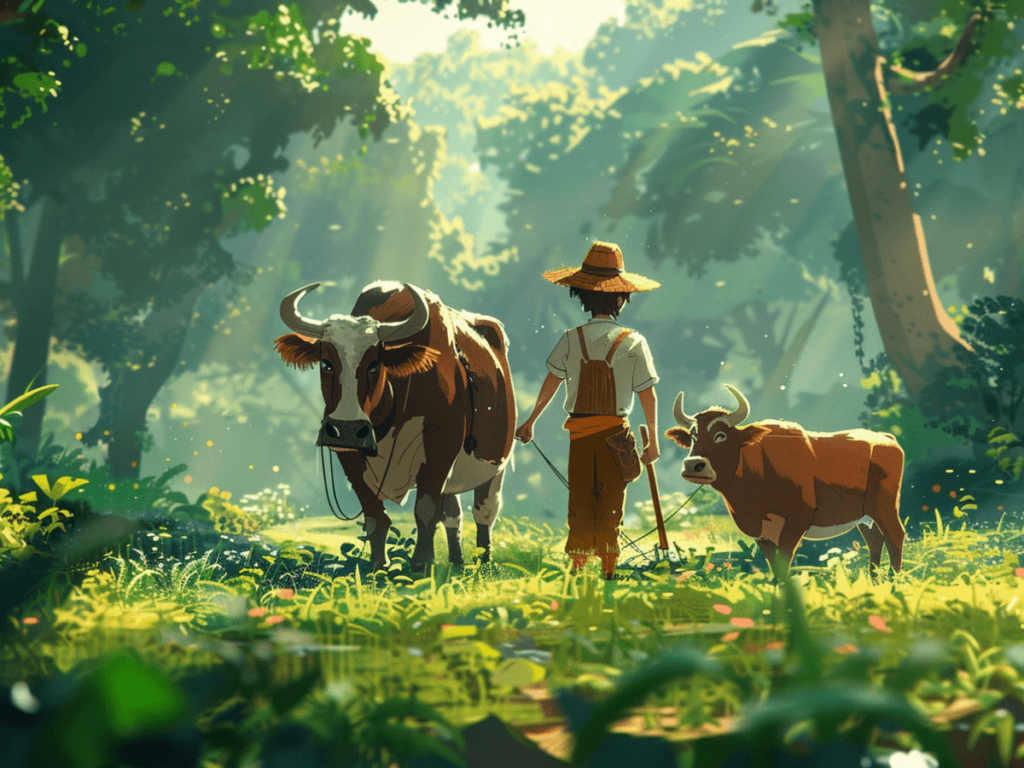
As he grazed the oxen, he pondered his misfortune: “What will you do now, poor man? You’ve sown the last of your grain, what will you and your wife and children eat in winter? Should we eat these oxen? But then what will we plow and sow with in spring?”
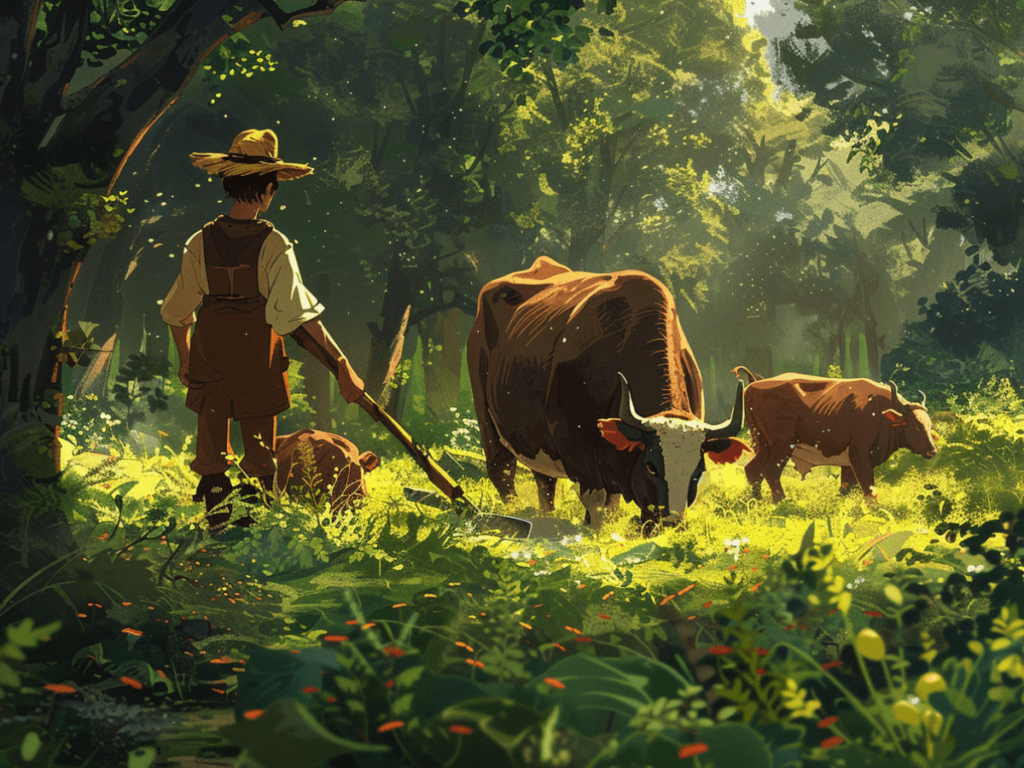
As he was thinking, an old raven cawed above him: caw-caw! “What kind of guest is this?” the farmer looked up.
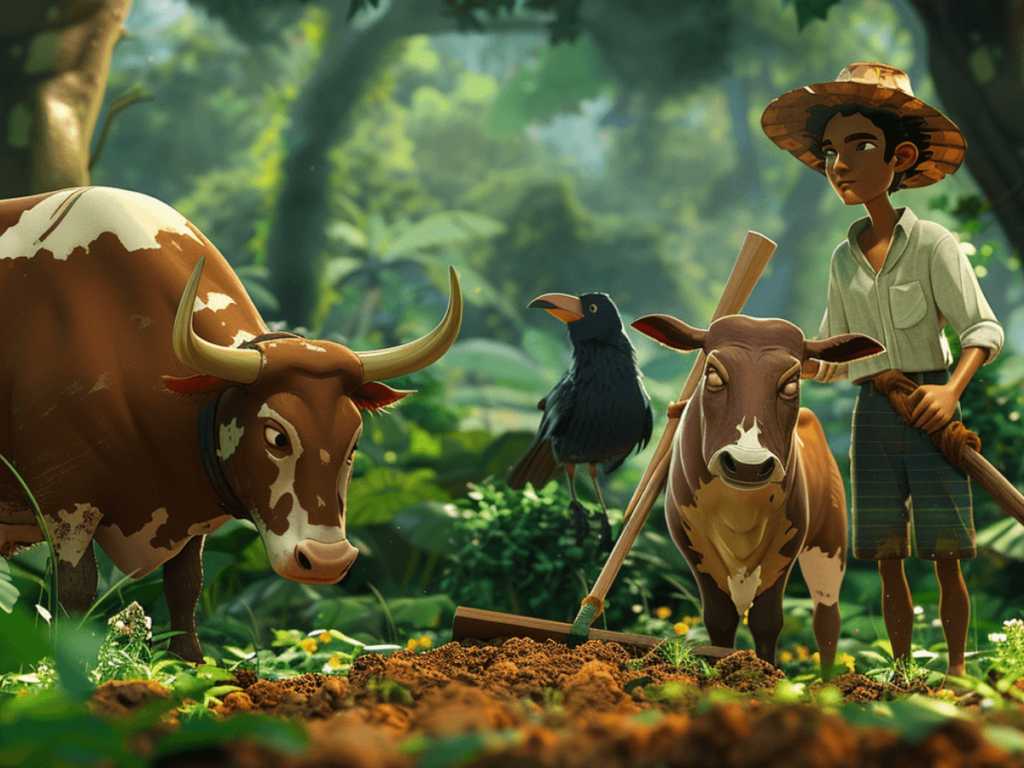
“Indeed, a guest,” said the raven, “give me what you have, or I’ll eat you right away!” “Eat me or not, it’s all the same; what can I give you when I have nothing myself?” “You have two oxen; will you give me one if I devour it all by myself for dinner?” “You won’t devour it; you’re as thin as a stick; a mouse would be enough for you!”
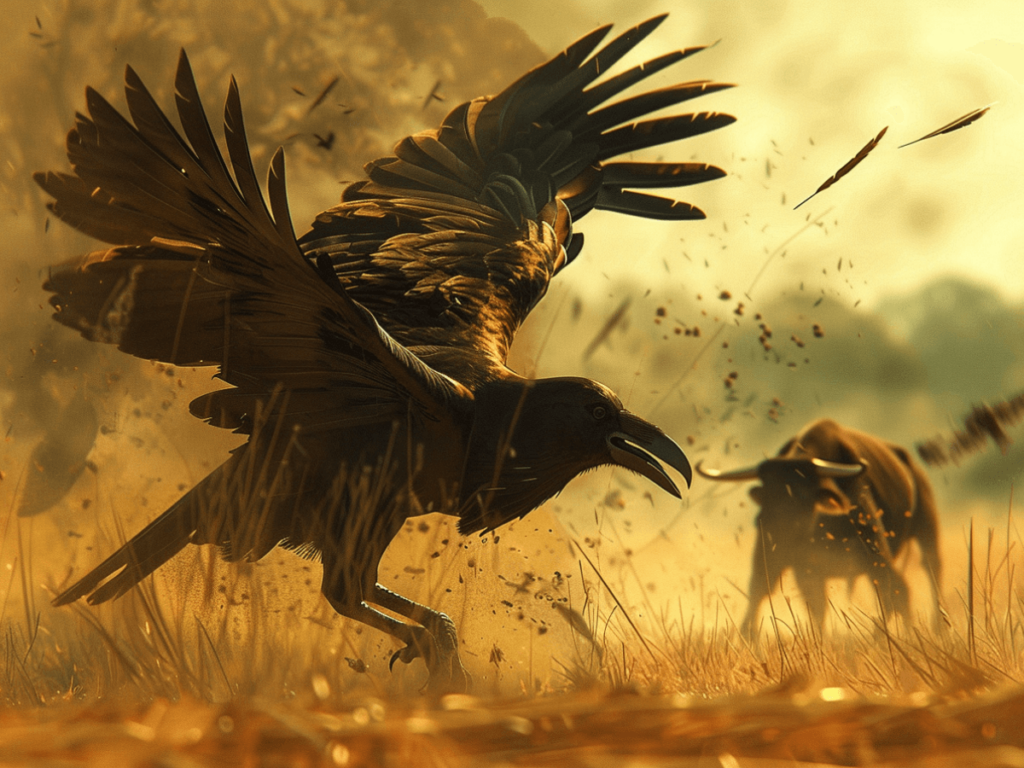
“Well, will you give it or not?” “I will! But not even a hair will be left of it for you!”
The raven swooped down on the ox, and in a moment, there wasn’t even a hair left of the whole ox. Where did it all go inside him?! The farmer became angry that he had lost an ox for nothing and said, “Well, since you’ve eaten one, eat the other one too!” And the raven swooped down on the other ox, and in a moment, not even a hoof was left of that one either.
“Well, you’ve really done it now! How can I face my wife now? I’d rather perish here!” said the farmer.
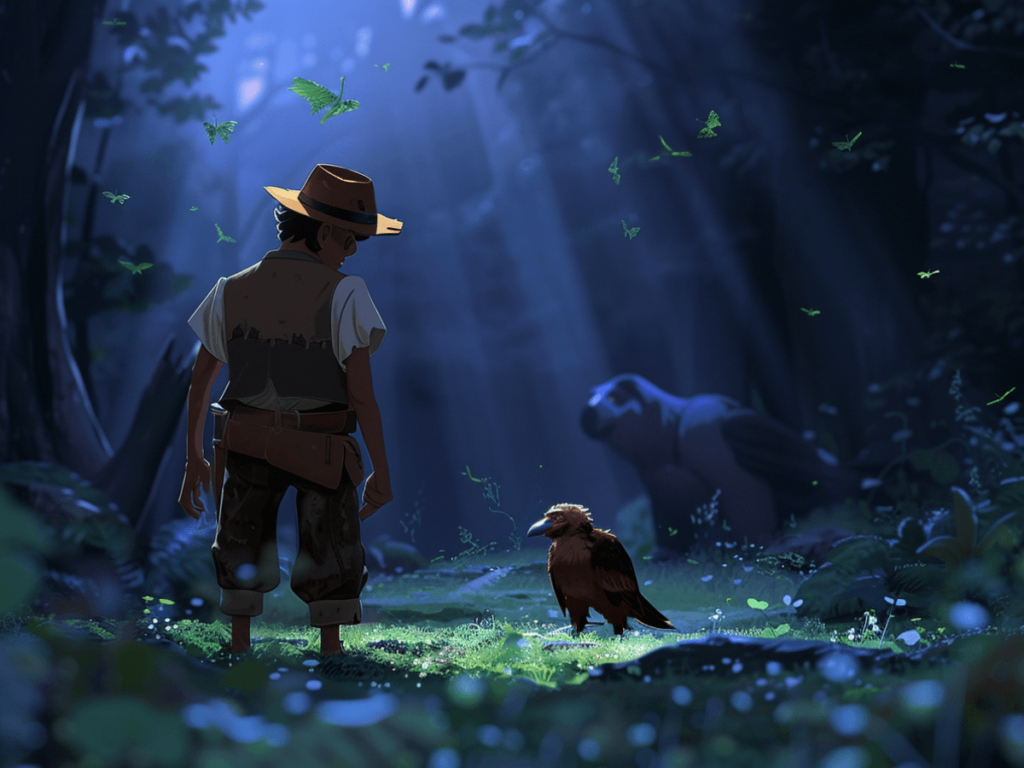
But then the satiated raven cawed cheerfully and said, “It would be a pity to lose you! Since you’ve fed me, don’t worry about anything now; I’ll pay you for those oxen, if you can follow me?” “Oh, I’ll follow you – into your gullet; it’s as dark as pitch; I wish it had swallowed me already!” “Quiet, man!” said the raven. “Better take my advice. Go home, soothe your wife, tell her you sold the oxen to a rich raven who will pay you in the morning. Your wife will find a way to send you after me with enough food; because you’ll walk for three days and three nights, which I will fly this very evening. To help you follow, I’ll break the treetops wherever I fly; they won’t let you stray from my path and tomorrow after dawn you’ll see them. You’ll come to my castle and there I’ll shower you with gold and silver. Now, don’t delay and do as I say!”
The raven took to its wings, and in the blink of an eye, it was gone, only the sound of breaking treetops could be heard where it flew. The poor man, left with nothing, was at a loss; he was afraid his angry wife would scratch his eyes out at home and then he would end up with nothing either way. He braved himself for the worst – facing his wife. But when the wife heard about gold and silver, she became as gentle as a dove and cooed around her golden husband. “Don’t worry about anything,” she said to him, “we’ll manage it right away. You left your cart at the manor where you brought wood, they’ll lend me a measure of flour there; I’ll bake you some ash cakes right away and you’ll go.” Even before dawn broke, she had rushed him out of the house with ash cakes, so he could return sooner, showered with gold and silver.
The poor farmer walked and walked, as long as there were marks on the treetops and ash cakes in his bag. But on the third day towards evening, there was nothing left in his pocket, and even if the treetops had been broken, he couldn’t see them in the dark. He had wandered far and was exhausted. Suddenly, as if something had dawned on him.
He found himself in a large green meadow, and around him, like a new world – three golden walls gleamed. There were no creatures around. Only in the middle of the meadow stood a shepherd with a staff, a man as tall as a pine tree. “Come boldly here, man; what do you want?” called out the shepherd. “Oh, my dear shepherd, well, what do I want here when I don’t even know where I am?
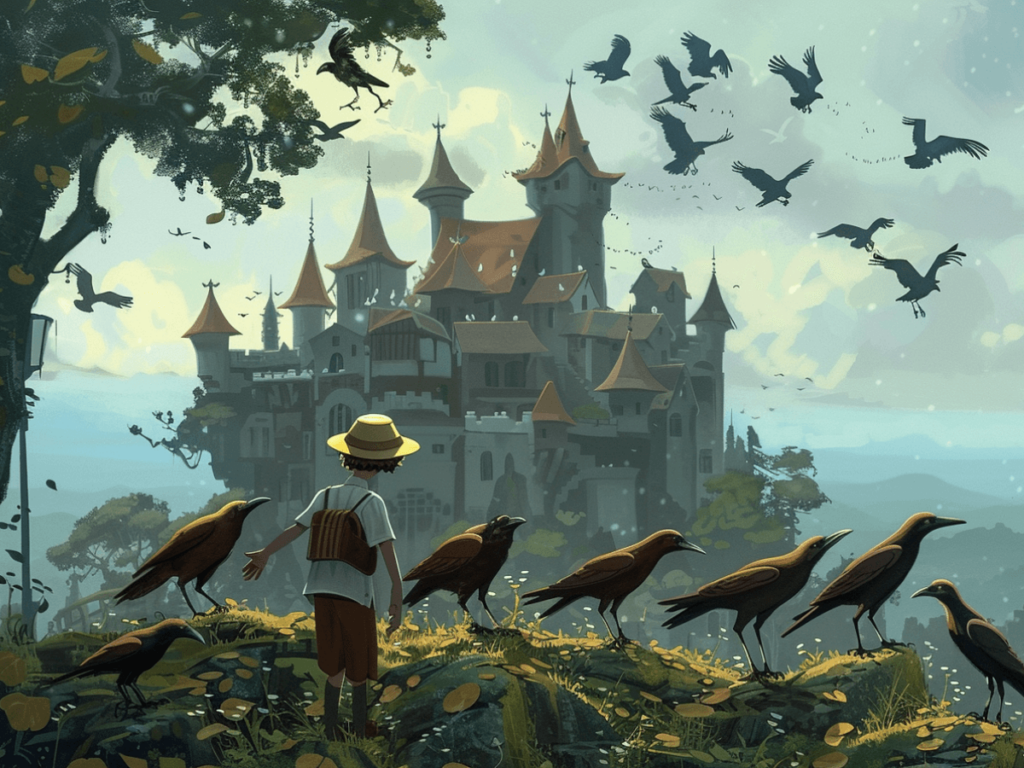
But at least tell me, who lives there in those shiny castles?” “Well, my flocks, my ravens live there.” “Well, that’s it, look, that’s who I’m looking for!” the man rejoiced when he heard about the ravens. And he told the shepherd the whole story.
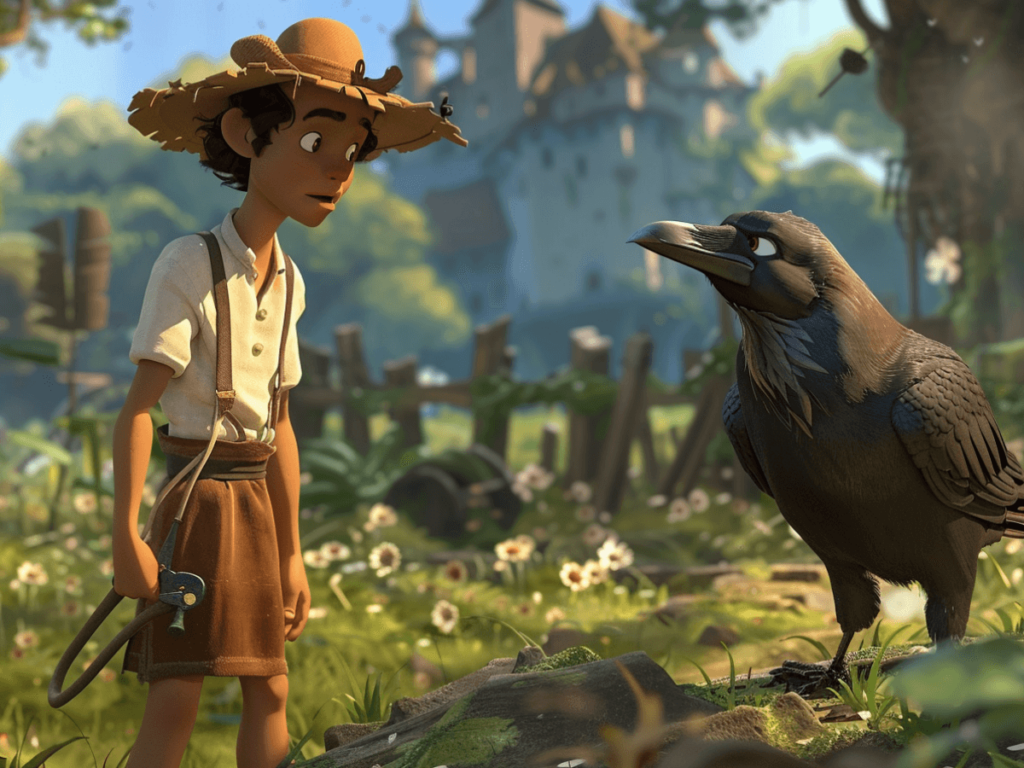
The shepherd just shook his head and said, “And would you recognize your debtor among the other ravens?” “That would be something if I didn’t recognize him; he was lame in one leg and was old, more gray than black. Only his beak was certainly hard, because he pecked my ox in an instant and the forest just crackled where he broke the treetops.”
“We’ll soon find out if you recognize him,” said the shepherd and whistled on his thumb, so that the mountains echoed.
The first flock of ravens flew in and occupied one castle; but the farmer didn’t recognize any of them. The shepherd whistled a second time; the mountains echoed. The second flock of ravens flew in and occupied the second castle; but the farmer again didn’t recognize any of them. The shepherd whistled a third time, the mountains roared, ravens flew in from all corners of the world and occupied the third castle; but the farmer couldn’t recognize any of them even now.
“Are you all here?” the shepherd then asked the ravens. “All,” answered the ravens, “only the old limper is still wobbling somewhere.” “Well, that must be him,” said the shepherd. “But wherever he’s wobbling, you, farmer, listen to what you should ask for. My servant, the limper, will lead you to this third castle and there he would shower you with gold and silver; but don’t take that, it would turn into sand. Ask only for that old little grinder there on the table; you’ll see later what kind of grinder it is, when you command it:
‘Little grinder, turn around; table, stretch out; tablecloth, spread yourself: give what you have to eat and drink!'”
At that moment, the old limping raven was flying in from the direction of the mountains. “Where have you been, servant?” the shepherd asks him. “My lord, I was looking for this man in the forest so he wouldn’t get lost in the night,” said the limper.
“So you’re also the one who deprived him of his oxen; give him right away whatever he asks for!”
As the shepherd commanded, he just waved his staff once, and immediately the ravens dispersed each to their own, and the old limper led the man to that third castle.
Here, out of sheer gratitude, he would have showered him with gold and silver; but the man wanted nothing but that old little grinder that stood in the middle of the table. “What will you do with that? You don’t know how to use it!” the old raven tried to dissuade him. “I know or I don’t know, but I don’t want anything else!” said the man. So finally, the raven gave him that little grinder and he tucked it into his empty bag.
With that, he left, because it was already dawning. But they say it’s lonely on the road without bread. He felt hungry too.
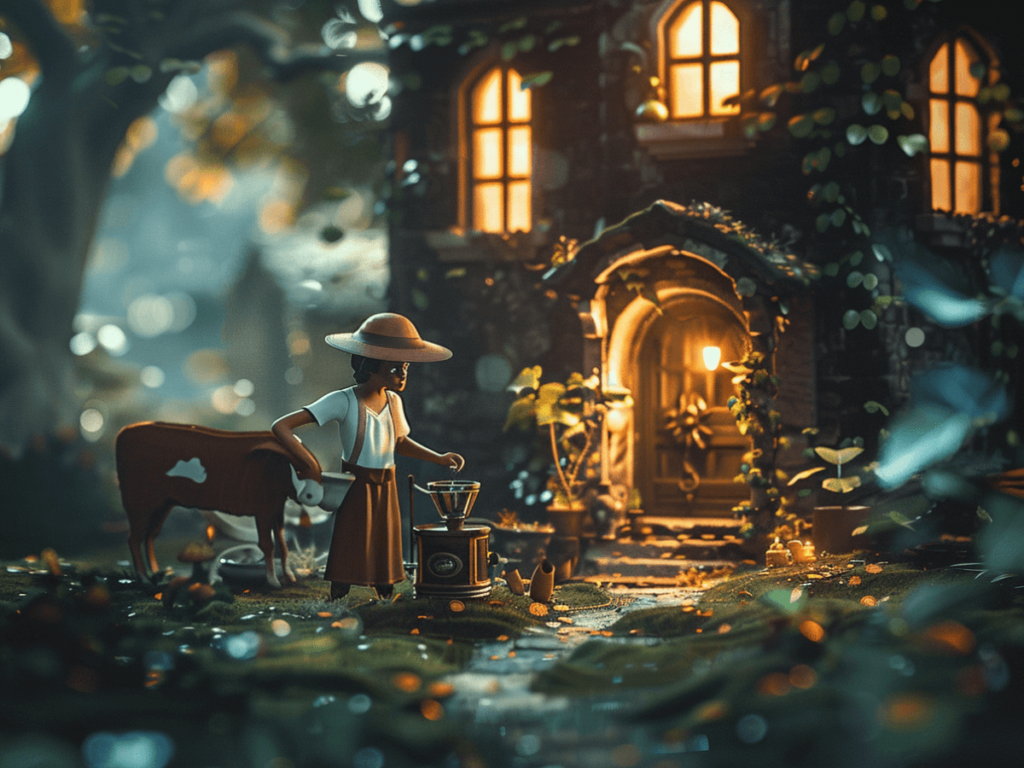
“Well,” he says, “bread is indeed a good companion; I’ll try what this grinder can do.” He takes it out of his pocket and commands:
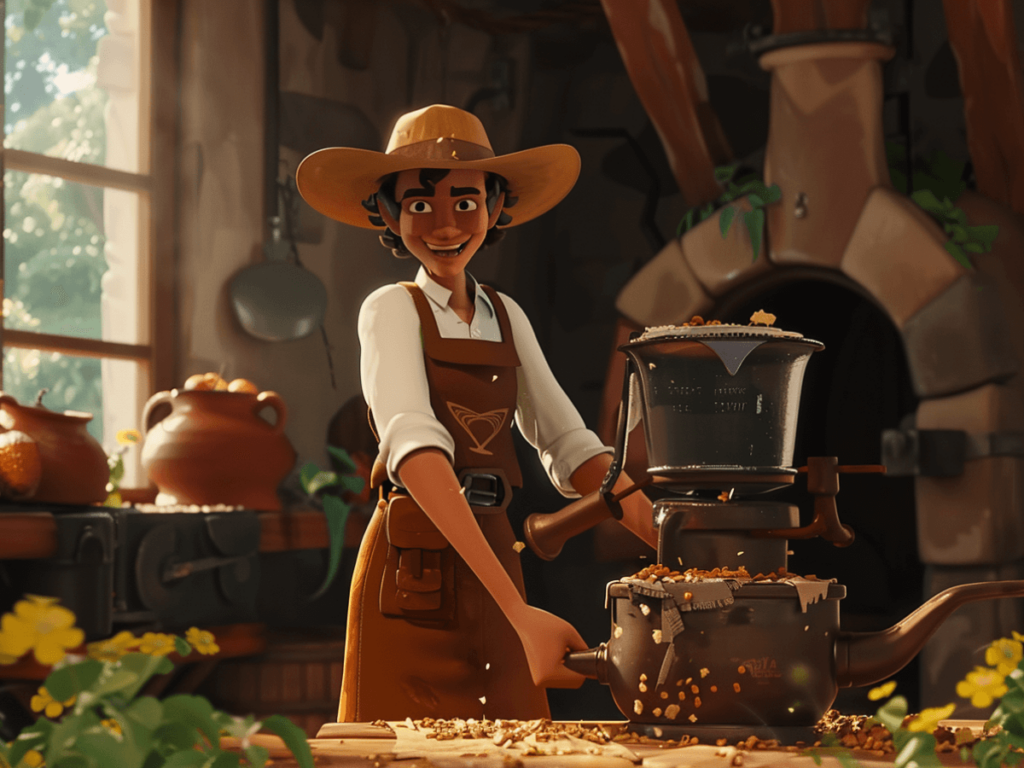
“Little grinder, turn around; table, stretch out; tablecloth, spread yourself: give what you have to eat and drink!”
As if it had grown out of that little grinder, a table stretched out, a tablecloth spread on it, and on that were foods and drinks: cakes, roasts, fruits, wine, and who knows what else! Oh, he heartily dug in! Although there was a lot, it still disappeared from that tablecloth as if it had been swept away.
A hungry shepherd, who was grazing sheep nearby on the hillside, was watching this. He immediately approached him. “Well,” he says, “offer me some too, since I’m here.” “Well,” says the farmer, “take and eat; you see there’s more than enough here.” When they had eaten and drunk, everything tidied itself back into that little grinder. And that shepherd says to him: “Oh, what a grinder that is!” “Oh, indeed it is,” says the farmer, “I wouldn’t give it up for the whole world!” “Oh, but my stick is still something else,” says the shepherd, “look at it!” Then the farmer looked and saw in the shepherd’s hand a stick with which he could hit him just once and it would have been over for him. He was indeed frightened, but he just asked what kind of stick it could be.
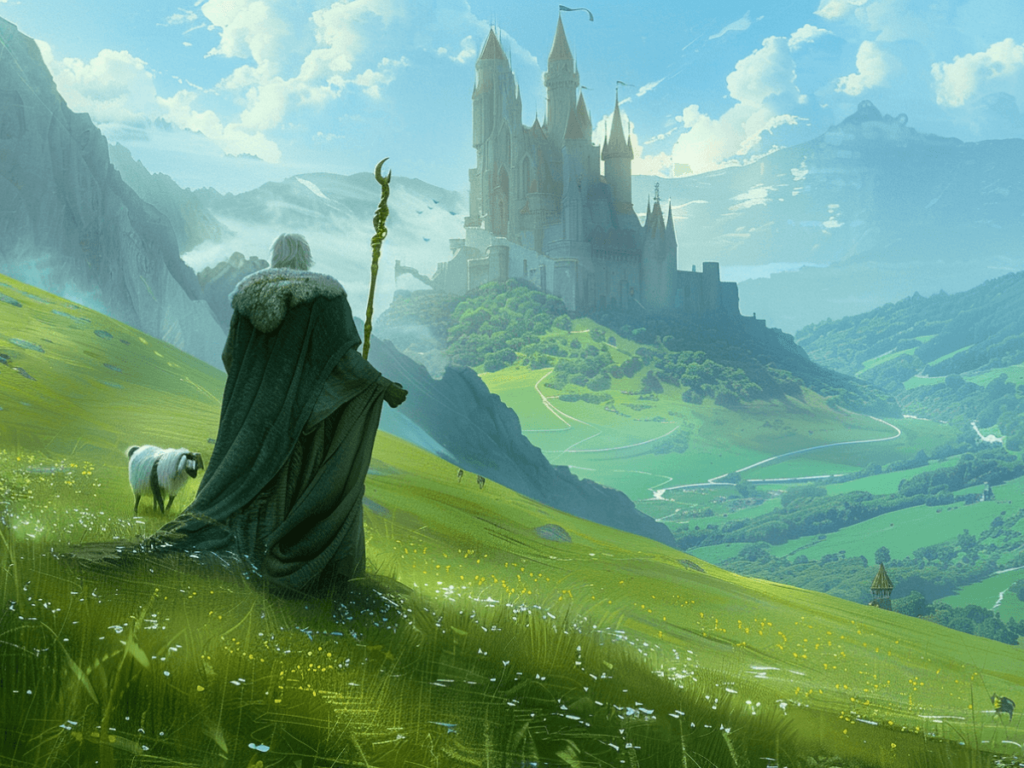
“This is,” says the shepherd, “such a stick that when you command it, it beats everything by itself and brings you whatever you want. I wouldn’t want to part with it, but I’ll give it to you for that grinder. Well, do you want to trade?” The farmer thought that it would be good to have such a stick, so they traded and parted ways.
But after a while, it started to bother him that he didn’t really know what he had given the grinder away for and that the stick wouldn’t feed him after all. It bothered him so much that he commanded the stick to kill the shepherd and bring him back his grinder. The stick began to whirl from end to end and was immediately by the shepherd, clubbed him so that he immediately fell dead, and the stick quickly brought back his little grinder to the farmer.
Now he had both the grinder and the stick and he set off more confidently. Then he met a soldier who was returning home hungry from a distant war. “Oh, man,” says the soldier, “don’t you have even a crumb of bread in that pocket? I would truly try to repay you for it.” And the farmer now proudly:
“I don’t have a crumb of bread, but I have something more; just sit down, you’ll eat and drink your fill right away.” And he immediately pulled out the grinder and it ground its thing. There was another feast. After the feast, the soldier says: “Oh, but what a grinder that is! But my sword is perhaps worth even more.” “What kind of sword?” asks the farmer. “This old scraper here at my side. When you command it, it immediately chops everything to pieces. But I surely have had enough of war and fighting; trade me that grinder for it.” The farmer traded again.
But the soldier wasn’t even three shots away from him when it bothered him again. “What good would it do me,” he thought, “if I could beat the whole world and had nothing to eat; or could I even defend myself at home from my wife like this? Stick, sword, after the soldier, kill him and bring me back my grinder!”
The stick whirled from end to end on the ground, the sword just clanged in the air; in an instant they were by the soldier, killed him and brought the grinder back to the farmer.
He goes on further. An artilleryman comes towards him and asks for a piece of bread, saying he’s about to die if he doesn’t get fed. So there was another feast right away. The gunner thanked for the feast; but he says he has something even different than that grinder. “What’s that?” asks the farmer. “Well, this three-cornered hat on my head. When I turn it front horn forward and say: fire! it immediately sparks and shots just pour out as if twenty-four cannons had thundered. I turn it second horn forward, shots pour out again; I turn it third horn forward, shots thunder again. And so many times as I turn it, so many times I fire, and nothing can withstand my shots. But,” he says, “I would trade it for that grinder; just for you, because you’ve fed me like this.” They traded. But this trade also bothered the farmer: “Well,” he thought, “who will I shoot at? I surely won’t shoot my wife and children?” He immediately sent the stick and sword after the gunner. They killed the gunner and brought him back his grinder.
He goes on even further, meets some white figure; she looked like some kind of soldier’s wife, and indeed she was returning from the camp where a tough battle had taken place before. She too begs him for the love of God for even a piece of bread. The grinder immediately ground and the white figure had something to lick her fingers with, and even got a bit under her cap. When she had a bit under that cap, she started to boast that this and that, she’s coming from the camp where many soldiers perished; but that only those perished on whom she waved her white handkerchief; but whoever’s eyes she wiped, immediately came back to life. “And,” she says, “this handkerchief would be useful to you too, and I could use such a grinder as yours. Will you trade?” From talk to talk, from bargaining to bargaining – he traded thing for thing here too.
But this bothered him even more now, what good would that handkerchief do him if he had nothing to eat. “And what,” he thought, “one soldier’s wife? I’ll destroy her too, since I destroyed those others.” And immediately the stick and sword had work again and brought him back the grinder.
He was already coming out of the forest and saw his village in the distance. “Hey, I didn’t get lost after all and I have all the things!” he jumped joyfully now. But something started to sting him in his heart and just kept whispering: “Still, you’re a bad person, to take so many things from others! to kill so many! Things come and go, but so many lives!” He defended himself against this, but it still wouldn’t leave him alone. “Well, it’s not,” he finally thought: “well, if everyone was right, then she was right too with that handkerchief.” He immediately commanded: “My dear little handkerchief, go and wipe the eyes of those killed up there!” In that moment, the handkerchief flew out of his hand and after a short time returned and brought him blood and tears as a sign that it had nicely wiped and resurrected all those whom the stick and sword had killed there.
So far, everything had been good for him and he hoped for the best at home when he would show his wife just that grinder. But here came the real trouble! She broke her spinning wheel on him, on the old fool, who had chosen an old grinder instead of being showered with gold and silver. But they say after a storm, the sun smiles more beautifully on the world; so it was here too. When the storm calmed down and the husband got a word in:
“Little grinder, turn around; table, stretch out; tablecloth, spread yourself: give what you have to eat and drink!” –
everything was immediately good: everyone ate and drank their fill. The wife caressed her husband, saying that it would indeed be good to feed like this, the children were hopping around the room, saying they had never eaten so much, right up to their throats.
“Oh, but you know what, my dear husband?” the caring wife began after a while. “With that lord from the manor, where we left our cart as collateral, I had a whole cross to bear at home! He sends me a message every day, asking what he’ll do with an old cart, that we should just return his flour. I know that the grinder can easily grind that measure of flour; but it would be good to appease that grumbling lord with something. It wouldn’t cost us much if we added a roasted turkey and a hare from this grinder to that measure of flour. I would take it all to him right away.”
“Well, you’re saying something,” said the husband, “that’s how we’ll appease him best; you just take it to him.”
The wife took it all with a nice greeting and thanks to the manor and put it on the lord’s table. She was waiting at least for a kind word, if not a gift for a gift. But here the lord snaps at her: “You such and such a tramp, where did you get this? You stole the turkey from the yard, you caught the hare in my forest! Just wait, you’ll pay for this!” He didn’t even wait for what she would say, just had her thrown into the dungeon and sent a bailiff for her husband to immediately appear before the lord with the bailiff.
The bailiff stood stubbornly before the farmer with the order. And our farmer at first just quietly to the bailiff:
“But, man, are you losing your mind that you would put me and my wife in the dungeon for what we gave as a gift to the lord?” But when the bailiff was even more stubborn and finally wanted to grab him, he got angry and called: “Little stick, little sword, defend me!” The stick jumped on the bailiff’s back and the sword flashed before his eyes. The bailiff ran away and returned with bruises to the manor. He scratched his back and barely stammered to the lord what had happened to him.
“You’re a coward if you let yourself be beaten!” said the lord and immediately sent two stronger ones for the farmer. But they returned with even bigger bruises and with the news that the farmer himself is coming behind them and that he will beat them all if they don’t release his wife from the dungeon. And indeed, the farmer was already there in the yard with the stick and sword and was making a big fuss that he would immediately beat and chop them all if they didn’t release his wife.
The angry lord shouted at the bailiffs and the servants: “Well, you good-for-nothings, why do I keep you if you can’t even handle this troublemaker? Tie him up right now and throw him in the dungeon!”
All the servants rushed at the farmer. But this time, the farmer wasn’t joking around. He commanded, “Stick and sword, beat them all, but spare the lord!” Immediately, all the servants were beaten down, with only the lord left trembling like an aspen leaf before the stick and sword.
“Now do you believe that I have power over you, not you over me?” said the farmer to the lord. And the lord just whimpered: “Oh, I believe, I believe; but what will I do now without servants? I’ll starve to death without anyone to work for me!”
“You’ll starve or not, that’s how it goes. But to prove to you that I didn’t take anything from you, I’ll even feed you and your servants. I’ll invite you with your whole household to lunch in an hour. Don’t worry, all these people will get up and go from this feast to another feast; as soon as my wife is here!” So said the farmer, and the lord immediately released his wife from the dungeon.
When the farmer was back home with his wife, he commanded his little handkerchief: “My dear handkerchief, go and wipe the eyes of those beaten in the yard!” The handkerchief flew out and soon returned, bringing him blood and tears as a sign that it had nicely wiped and revived all those whom the stick and sword had beaten there.
The relieved lord, seeing his servants back on their feet, ordered the farmer’s pawned cart to be loaded full of food, hitched four oxen to it, and sent it all to him, saying he should prepare the lunch from that. The farmer sent everything back, saying he didn’t need it, they should just come and sit at the table. The lord didn’t trust this, but out of fear of the stick and sword, and to avoid something worse happening, he promptly arrived with his entire household at our farmer’s place.
They could hardly believe their eyes when the farmer just set out the grinder and commanded it to grind, and immediately the table stretched out, the tablecloth spread, and everyone could choose whatever foods and drinks they desired. It was a feast of feasts!
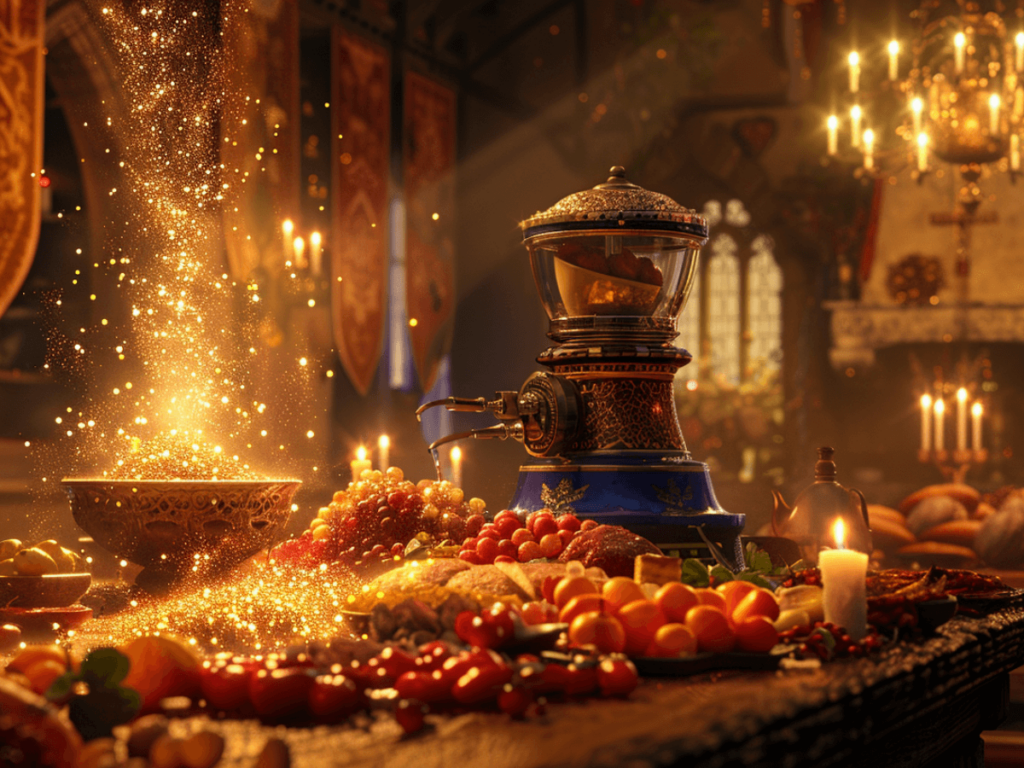
After the feast, the lord thanked him and returned home. But at home, he kept thinking about how to take everything from the farmer. He saw clearly that nothing would come of it as long as the farmer had the stick and sword; so he decided to trick these items away from him first. And he schemed it quite well. He gathered all his army and went to the farmer, saying this and that, he must go to war because three neighboring kings are preparing to attack him, and with his army alone he doesn’t dare to face three at once, so would the farmer lend him that stick and sword. The farmer just laughed and lent them to him.
The lord didn’t know how to command the stick and sword, but as soon as he had them with him, he positioned himself with his entire army in front of the farmer’s house and demanded that the farmer hand over the grinder now, or he would immediately destroy everything from the ground up.
“Is that really so, my lord?” asks the farmer.
“Really!” says the lord.
“Well, if it’s really so, let it be really so! But not to me, but to you!” With that, the farmer turned his three-cornered hat on his head and said: “Fire!” It sparkled, shots poured out, and the lord’s army was gone. He turned it a second time and as he said: “Fire!” the lord’s courtyard was swept to dust. He turned it a third time and as he said: “Fire!” the lord’s castle was uprooted from its foundation.
Only now did the lord see into whose hands he had fallen and how he had trapped himself. He began to beg the farmer on his knees to forgive him, saying he would rather serve him. “Well, for such a deceitful old woman as you are, nothing else will do!” said the farmer, and that was that.
But so that they wouldn’t be left here alone without people, and so that the farmer, now as the lord, would always have someone to serve him, and so that the grinder would always have someone to grind for, the farmer once again ordered his dear little handkerchief to resurrect those who were killed, and it did so. When they were all on their feet again, the farmer once more ordered the stick and sword to give everyone a good thrashing, not sparing even the lord, as a lesson. And then he added: “This is what will happen to you when you’re against me! But so that you also know how it will be when you serve me faithfully, come here for a feast!” With that, he commanded once more:

“Little grinder, turn around; table, stretch out; tablecloth, spread yourself: give what you have to eat and drink!” And only now was there a feast above all feasts!
From that time on, the peasant lived like a great lord and ruled justly. His mill continued to grind good things, and all who faithfully served him were richly rewarded for their work. And so the fame of the miraculous mill spread far and wide.
And if he hasn’t died yet, the mill is still grinding for him today.
From the collection of Slovak legends and rumours collected by the Slovak storyteller Pavol Dobšinský.



The Little Magic Grinder